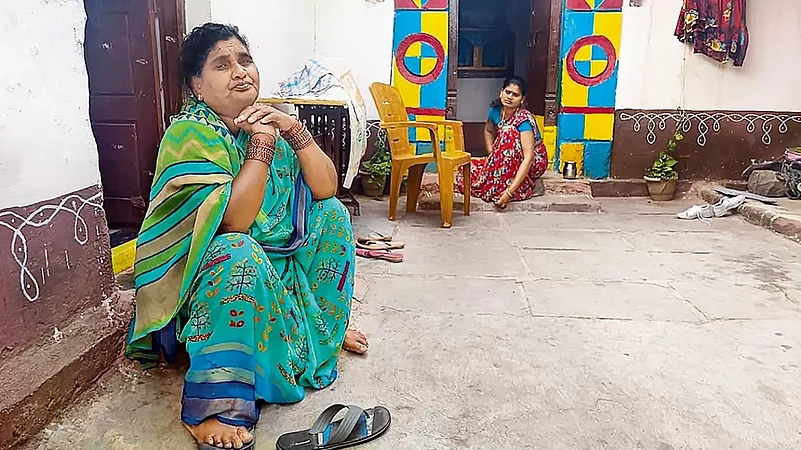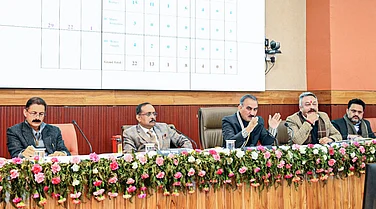Driving through vast swathes of cotton fields flanking either side of the Hyderabad-Nagpur National Highway is a small, barely noticeable board which welcomes one to Sadashivpet Mandal of Sangareddy district in Telangana.
That’s around where, Chikkamma, one of the many surviving widows of tenant farmers in the region, lives out her despondent years. Chikkamma’s husband, Baliah, once grew paddy in their 22-acre field. Chikkamma still stays in her small house, but it has stopped being her home ever since her husband died by suicide after failing to pay back Rs 50,000 to a moneylender. “He died two years ago. We are now saddled with a debt of around Rs 27 lakhs,” says Chikkamma, sitting on the threshold of her one-room house with chipped white walls—the same walls that were once filled with the echoes of her complete family.
Like Baliah, one in every three farmers in Telangana is a tenant farmer, according to a door-to-door survey conducted by Rythu Swarajya Vedika (RSV), an independent farmers’ organisation in Telangana and Andhra Pradesh. Its finding takes the projected total number of tenant farmers in the state to 2.2 million, double the National Sample Survey Organisation’s (NSSO) official, but seemingly conservative estimate. Despite their large numbers, the Telangana government has refused to recognise them as farmers, denying them benefits from any of the state’s farmer-related schemes, including the flagship Rythu Bandhu. This steadfast refusal to include tenant farmers in the scheme appears to be one the key reasons for disenchantment among the grouping towards the incumbent BRS government.
Ever since the separate state of Telangana was formed in 2014, Chief Minister K. Chandrashekhar Rao has been known for introducing a slew of welfare measures for marginalised communities. Experts have cited these measures as the key to his two consecutive terms in power. But as in the case of Chikkamma and her family, many others like her, who really need welfare measures the most, have ironically not been able to tap into the benefits of such schemes.
Farmers’ Welfare
The coveted Rythu Bandhu scheme, initiated by the Telangana government in 2018, aims to support farmers’ investments in two crops annually. Under this flagship scheme, farmers receive Rs 5,000 per acre per season or Rs 10,000 per acre annually. However, it’s important to note that the cash support from the Rythu Bandhu scheme is exclusively entitled to land title-holding farmers. Tenant farmers do not make the cut.
Five cattle farmers sit outside their partially constructed houses in a circle, as if in solidarity with each other’s mounting debt. “I leased (five acres) land for around Rs 15,000 per acre after accumulating the money by taking loans,” says Raju, a cattle farmer. He paid the full amount of around Rs 1 lakh in cash to the landowner back in Ugadi season (March) to lease the land. To pay the lease amount, he took a loan from a private moneylender and another source, which he wasn’t willing to disclose, for renting the tract.
“Because the government doesn’t give us any support, we end up getting trapped in a system of continued borrowing that eventually forces us into debt. I have a debt of around Rs 70,000 and I have to pay it back in five to six months,” Raju says. He doesn’t benefit from the Rythu Bandhu scheme. The money goes only to the upper-caste landowners, who are mostly economically well-off.
The five cattle farmers are expecting further losses this year. The weather has been unkind, with unseasonal rains and storms between March and May. “The compensation for this crop loss also goes to the landowner, who is not even cultivating the land. While they are entitled to give us some money, why will they?” rues Maninder, another farmer in the group.
As per RSV’s study, the Agriculture Department has to provide a passbook to these tenant farmers to ensure they can sell their produce to the government at the Minimum Support Price (MSP). Further, every season, the state agriculture department registers the names of cultivators in the name of crop booking to keep account of passbooks that have to be issued. However, 41 percent of the tenant farmers did not know under whose name the booking had been done, while 40 percent said it was done under the landowner’s name, making it very hard for the tenant farmer to retrieve the entire support amount.
The BRS government and KCR have maintained that the number of tenant farmers could not be identified because they do not cultivate on one fixed tract of land. However, farmer activists disagree. They say that the faulty implementation of the Land Licenced Cultivators Act (2011), which was passed to identify and register tenant farmers as cultivators, has led to the current state of tenant farmers in the state.
According to the Act, tenant farmers were permitted to use a Loan and Other Eligibility Card (LEC), intended as a middle path to offer legal protection. However, Raju, Maninder and other tenant farmers in the region claim that they haven’t received these cards since 2018, effectively leaving them with no legal protection.
Chikkamma, meanwhile, delves deeper into her husband’s plight. Baliah wasn’t able to arrange for the Rs 50,000 demanded by his moneylender. He searched all night for the money, she recalls. He eventually gave up and hanged himself on a tree in his own field. His family was unaware of his final step. “The moneylender blackmailed him, saying if he doesn’t return the money, he would strip him of his izzat (honour),” Chikkamma says.
Around 8,000 farmers have died by suicide in Telangana since 2014. A sample study of 692 farmer suicides done by RSV in 2018 showed that 75.2 percent of those who took their own lives were tenant farmers. Another sample study of about 140 farmer suicides, conducted in 2021, showed that about 80 percent were tenant farmers.
The buzz in these farmers’ circles ahead of the state assembly polls is that they want a change in government this time around. The Congress has promised Rs 15,000 per acre in cash support for farmers and Rs 12,000 to tenant farmers every year, immediately upon forming the government.
While BRS has promised ‘corrective’ measures, the ruling party’s election manifesto still doesn’t recognise tenant farmers. It has instead promised to increase the Rythu Bandhu scheme’s annual benefit to Rs 16,000 per acre in the next five years. “While the scheme is good, it has to be extended to marginal, small and tenant farmers as well. We are thinking of voting for the Congress, but we are not sure if the party’s local leaders will fulfil their promises,” Maninder says.
Will Dalits Support KCR?
Apart from farmers, KCR has leaned on support from Dalits and other minorities in the state since its formation. According to a household survey conducted by the Telangana government in 2014 (the results of which weren’t released publicly but have been popularly cited in media reports since), OBCs constitute 51 percent of its 3.6 crore population. Bunched together with Scheduled Castes, Scheduled Tribes and minorities, the population share stretches over 85 percent. The TRS party won 13 of the 19 seats reserved for SCs in the state in the 2014 assembly election. This number went up to 16 in 2018.
But this time, there is discontentment within the Dalits. “BRS won the previous elections because of the support of BCs and SCs. Five dominant BC castes— Goud, Munurukapu, Yadav, Padmashali and Mudiraj and two SC castes—SC, ST voters supported BRS,” says G Kiran Kumar, a PhD research scholar at the University of Hyderabad and the national president of the All India OBC Students Association, adding that these groups might not back KCR this time due to unfulfilled promises.
KCR has made significant promises in his Dalit outreach, including commitments to appoint a Dalit Chief Minister, implement the Dalit Bandhu initiative and allocate three acres of land to Dalits.
A decade ago, Rao had also promised a Dalit Chief Minister if his party came to power. That promise hasn’t seen light to this day. K Chandrasekhar Rao has occupied the chief minister’s throne since the birth of the state. Incidentally, the chief minister belongs to the Velamma (zamindar or landlord) community and his party has come under frequent criticism for being an ‘upper-caste party’.
KCR has also repeatedly spoken very highly of his government’s flagship programme for Dalits—the Dalit Bandhu scheme. “In the past seven decades, has anyone thought of such an innovative scheme? Why were other parties unable to come up with such an idea except BRS?” he had said.
Launched in 2021, the scheme aims to promote the economic development of families belonging to the Scheduled Caste (SC) community by providing financial assistance of Rs 10 lakh to eligible SC families to start their own businesses or entrepreneurial ventures.
However, the scheme, along with KCR’s outreach to the minorities hasn’t yielded much benefit, notes Kumar. And while the benefits of the scheme have reached some Dalit families in every constituency, this limited percolation, Kumar said, has created agitation in the majority of Dalit families which have been deprived of the same benefits.
The scheme was first implemented in Vasalamarri village in Turkapally mandal, which has around 250 Dalits, from 52 Dalit families. According to a report by Forum for Good Governance, it was revealed that as many as 75 people received the scheme’s benefits in the village, even though there were only 52 Dalit families.
The scheme’s beneficiaries are categorised across various sectors like agriculture, transport, manufacturing, retail and services, based on their preferences for utilising the scheme’s assistance. However, due to mismanagement in implementation, some received goods that didn’t benefit them. For instance, many women were given automobiles (tractors, goods vehicles, etc.), which they had to sell due to the lack of a driving licence or the need to hire a driver, resulting in increased costs, as highlighted in the report.
As per the scheme’s rules, the beneficiaries are finalised after the local MLAs’ recommendations—which has led to reports of bias in the selection of beneficiaries. Several protests erupted in many mandals after Dalits alleged that those who were on good terms with the MLA benefited greatly from the scheme. In October, Dalits from three villages—Nerella, Jagadevpet, and Ramaiahpally in Jagtial district protested in front of the local panchayat office in Dharmapuri Mandal alleging an unfair selection process on account of “biased” recommendations made by legislators.
Following these corruption allegations, KCR reportedly warned his MLAs, who were allegedly resorting to unethical practices and collecting cuts from beneficiaries of welfare schemes. The Chief Minister warned that such legislators would not only be denied tickets to contest in the polls but could also be expelled from the party. However, what about the Dalit families who were denied benefits due to these legislators? This is a question that many in the community appear to be asking.
The government also promised to provide three acres of land to economically disadvantaged SC women from landless agricultural families under the land distribution scheme introduced in 2014. The scheme carries a unit cost (one beneficiary) of Rs 21 lakh, with a maximum of Rs 7 lakh per acre. However, KCR claimed in the assembly that not much land in the state was available for distribution.
According to data from the State Scheduled Caste Corporation, only 6,900 people had been allotted land between 2014-2023 with Rs 729 crore spent under the scheme over the past nine years. According to the Telangana government, there are approximately 18 lakh Dalit households in the state.
Standing in front of the newly-inaugurated 125-feet-tall bronze statue of B.R. Ambedkar, just yards away from the Dr B.R. Ambedkar Secretariat, a Dalit activist says, that the KCR government has noted some discrepancies in these schemes and assured that its benefits would be delivered to the needy once they are brought to power again. But this assurance, the activist says, will most likely not have a positive impact on the voting pattern.
To add to KCR’s conundrum, the BJP and Congress have been eying the OBC vote through their support to the Munnuru Kapu community, which is economically and culturally powerful. And amid the vociferous demand for a caste census, the BRS leadership fears a shift of votes from communities that have backed its leadership historically.
(This appeared in the print as 'Welfare and Woe')


























